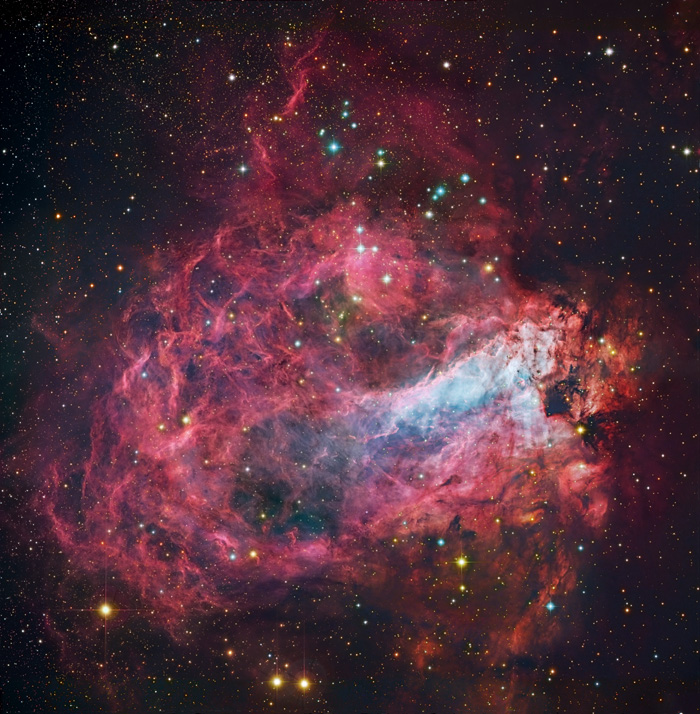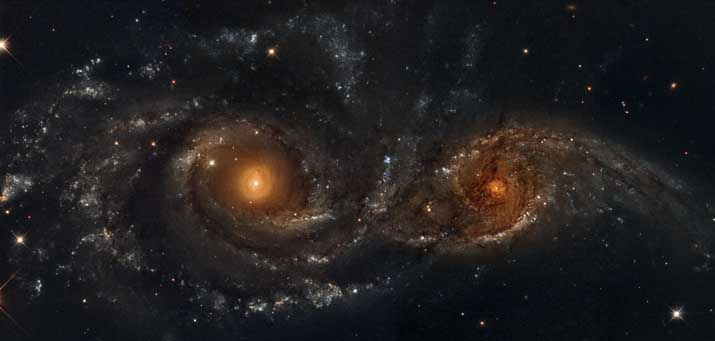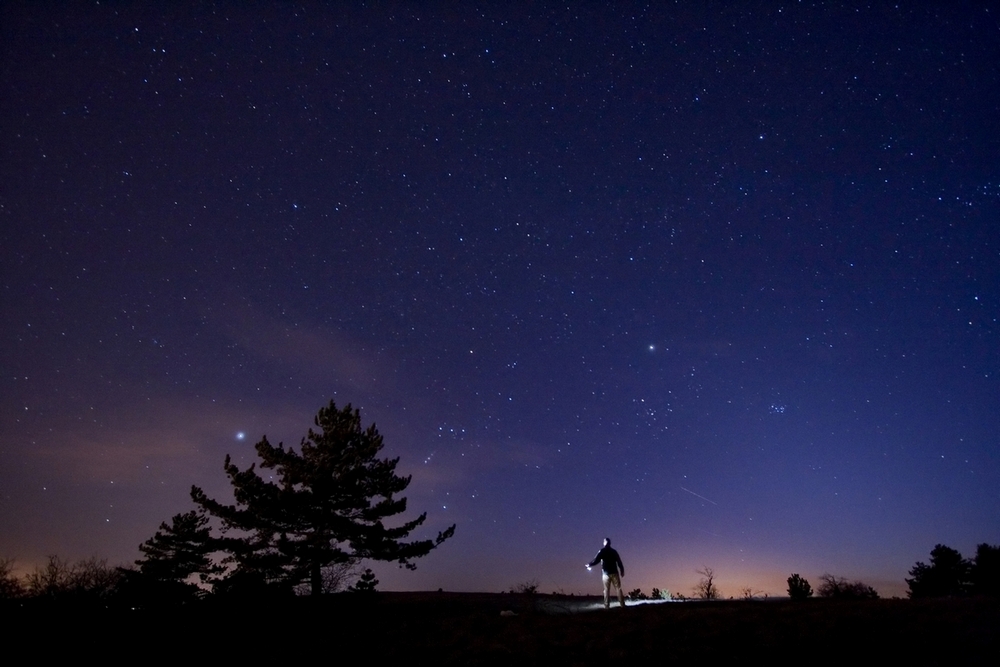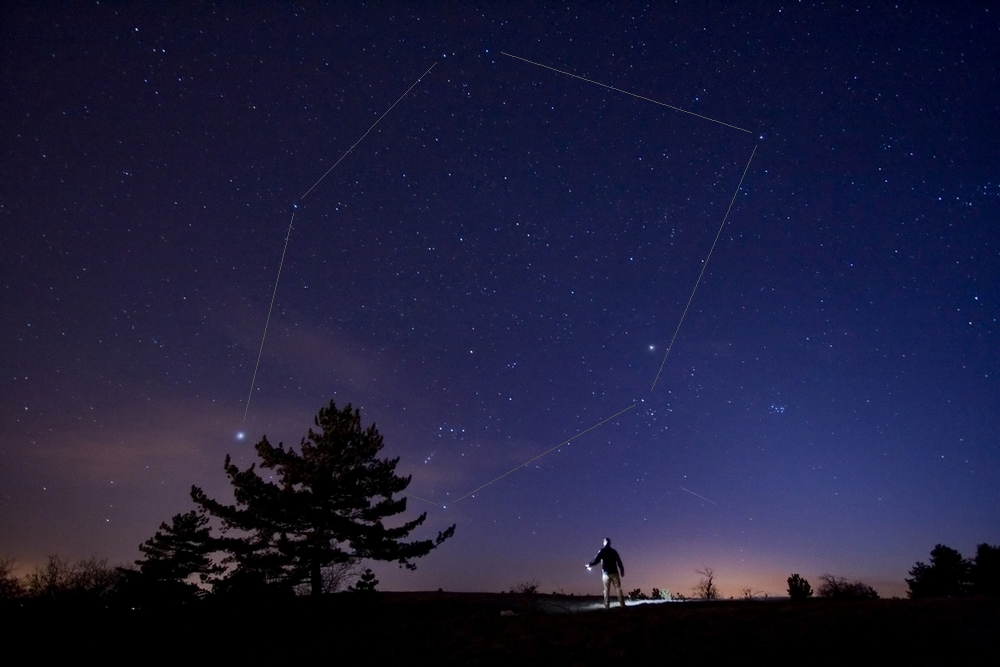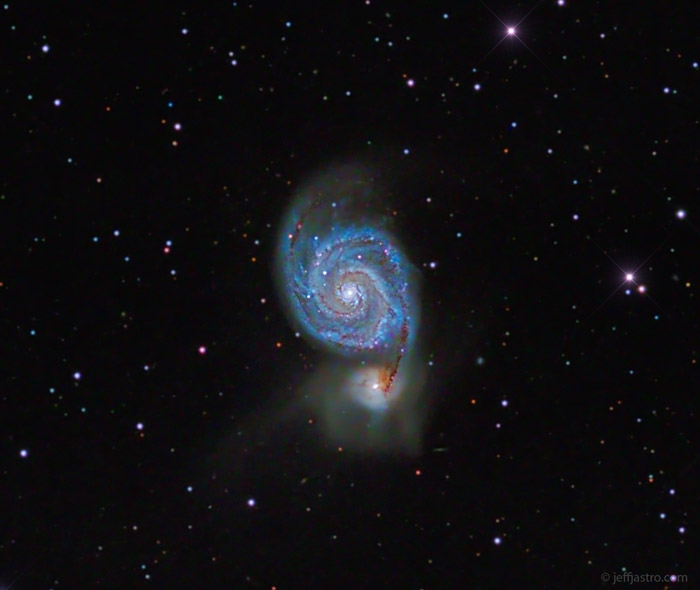Submissions: 2013 April
-
Bob Andersson
- Ensign
- Posts: 12
- Joined: Mon Oct 01, 2012 9:53 am
Soul Nebula (incl Lan 272)
The Soul Nebula.
http://andersson-design.s3.amazonaws.co ... a_2048.jpg
[attachment=0]soulbob.jpg[/attachment]
The stars are in full color for this one. The image also includes Lan 272, a 90,000° white dwarf, the faint and very blue star below and to the left of IC 1871. North is up.
Shooting info: Tec 140 plus FLI ML16803. 5 x 200 seconds R, G and B plus 8 x 1500 seconds Ha.
Bob.
http://andersson-design.s3.amazonaws.co ... a_2048.jpg
[attachment=0]soulbob.jpg[/attachment]
The stars are in full color for this one. The image also includes Lan 272, a 90,000° white dwarf, the faint and very blue star below and to the left of IC 1871. North is up.
Shooting info: Tec 140 plus FLI ML16803. 5 x 200 seconds R, G and B plus 8 x 1500 seconds Ha.
Bob.
Last edited by owlice on Mon Apr 08, 2013 2:39 pm, edited 1 time in total.
Reason: Attached smaller image for faster downloading; left link to larger image. Please keep images under 400K. Thanks for sharing!
Reason: Attached smaller image for faster downloading; left link to larger image. Please keep images under 400K. Thanks for sharing!
-
ftherrmann
- Science Officer
- Posts: 141
- Joined: Sun Jan 30, 2011 2:56 am
Re: Submissions: 2013 April
-
Efrain Morales
- Science Officer
- Posts: 492
- Joined: Fri Oct 22, 2010 8:15 pm
- AKA: Jaicoa
- Location: Aguadilla, Puerto Rico
- Contact:
Saturn, Moon Tethys, Dione
Saturn on April 6th, 04:49ut. Also in view are two moons (top) Tethys (L) and Dione (R). A slight brighteness on the rings (Seeliger Effect) and the shadow is going behind the disc as it approaches opposition within weeks from now.
Re: Submissions: 2013 April
Jupiter Ammon (reproduction on-site in the Municipal Forum, clypeus original in the National Museum of Roman Art of Merida), and Jupiter.
Last edited by Rothkko on Tue Apr 09, 2013 5:58 pm, edited 1 time in total.
Re: Submissions: 2013 April
M17, The Omega Nebula in Sagittarius
http://www.robgendlerastropics.com/M17-HST-Subaru.html
Copyright: Robert Gendler, Subaru Telescope (NAOJ), Hubble Legacy Archive Aurora
Copyright: Keane Beamish
[attachment=0]_MG_2569.jpg[/attachment]
http://www.robgendlerastropics.com/M17-HST-Subaru.html
Copyright: Robert Gendler, Subaru Telescope (NAOJ), Hubble Legacy Archive Aurora
Copyright: Keane Beamish
[attachment=0]_MG_2569.jpg[/attachment]
-
IanP
- Science Officer
- Posts: 135
- Joined: Fri Jan 06, 2012 5:21 am
- Location: Perth, Western Australia
- Contact:
Omega Centauri, 2013 April
Omega Centauri 2013
Cam: DSLR 60Da
Scope: CPC925 (hd-wedge) +F6.3 reducer
Higher res @
http://westcoastpics23.blogspot.com.au/
Cam: DSLR 60Da
Scope: CPC925 (hd-wedge) +F6.3 reducer
Higher res @
http://westcoastpics23.blogspot.com.au/
Re: Submissions: 2013 April
NGC 6590 and NGC 6589 in Sagittarius.
A mix of emission, reflection and dark nebulae.
Larger version:
http://www.pbase.com/image/149600158
Thanks for looking!
Kfir Simon
A mix of emission, reflection and dark nebulae.
Larger version:
http://www.pbase.com/image/149600158
Thanks for looking!
Kfir Simon
-
stringdom42
- Ensign
- Posts: 30
- Joined: Sun Mar 03, 2013 8:45 pm
- Location: Washington, DC
- Contact:
Re: Submissions: 2013 April
Up close and personal with Titan's haze
http://www.flickr.com/photos/valerieklavans/8634118211/
Copyright: NASA / JPL / SSI / composite by Val Klavans
http://www.flickr.com/photos/valerieklavans/8634118211/
Copyright: NASA / JPL / SSI / composite by Val Klavans
Re: Submissions: 2013 April
M65, M66 and the supernova in M65 / SN 2013am in Leo
http://www.elateobservatory.com
http://www.irida-observatory.org
Copyright: Velimir Popov
M65 and M66 are a part from The Leo Triplet, a well known conspicuous grouping of galaxies (also known as the M66 Group). This is a small group of galaxies about 35 million light-years away in the constellation Leo.
SN 2013am - Type II (References: ATEL 4910, CBAT TOCP): On 21.638 March 2013, M. Sugano, Kakogawa, Hyogo-ken, Japan reported the discovery of an apparent supernova in M65. The object received its official designation, SN 2013am (CBET 3440). The coordinates of SN 2013am are R.A. : 11h18m56.93s, Dec: +13°03'49.3". It is located 15".3 east and 103".2 south of the center of M65
Higher resolution and more information is avaliable here ...
Thank you for looking ...
http://www.elateobservatory.com
http://www.irida-observatory.org
Copyright: Velimir Popov
M65 and M66 are a part from The Leo Triplet, a well known conspicuous grouping of galaxies (also known as the M66 Group). This is a small group of galaxies about 35 million light-years away in the constellation Leo.
SN 2013am - Type II (References: ATEL 4910, CBAT TOCP): On 21.638 March 2013, M. Sugano, Kakogawa, Hyogo-ken, Japan reported the discovery of an apparent supernova in M65. The object received its official designation, SN 2013am (CBET 3440). The coordinates of SN 2013am are R.A. : 11h18m56.93s, Dec: +13°03'49.3". It is located 15".3 east and 103".2 south of the center of M65
Higher resolution and more information is avaliable here ...
Thank you for looking ...
Last edited by ViliMax on Wed Apr 10, 2013 6:18 am, edited 2 times in total.
Re: Submissions: 2013 April
Airglow
Copyright Brian Larmay

Higher resolution at: http://cygnusxone-telescopiceye.smugmug ... &lb=1&s=X2
Canon 60D
Peleng 8mm fisheye
Copyright Brian Larmay

Higher resolution at: http://cygnusxone-telescopiceye.smugmug ... &lb=1&s=X2
Canon 60D
Peleng 8mm fisheye
-
astrofotografen.se
- Ensign
- Posts: 34
- Joined: Thu Apr 11, 2013 6:45 am
Re: Submissions: 2013 April
Aurora 360 degree Virtual Reality Experience
Here's a totally new experience I've done with my aurora image data from March 17 when there was a really amazing aurora. I've done a virtual reality experience from my time lapse so that you can pan around watching the aurora from any angle. The animation consists of 2,641 raw images that has been projected to fit into this virtual world.
Click on the image below to experience the aurora

Clear skies
Astrophotographer Göran Strand
http://www.astrofotografen.se/
http://www.facebook.com/fotografgoranstrand
Here's a totally new experience I've done with my aurora image data from March 17 when there was a really amazing aurora. I've done a virtual reality experience from my time lapse so that you can pan around watching the aurora from any angle. The animation consists of 2,641 raw images that has been projected to fit into this virtual world.
Click on the image below to experience the aurora

Clear skies
Astrophotographer Göran Strand
http://www.astrofotografen.se/
http://www.facebook.com/fotografgoranstrand
-
lynnhilborn
- Ensign
- Posts: 61
- Joined: Mon Dec 05, 2011 6:17 pm
- Location: Grafton, Ontario
- Contact:
Grazing Galaxies...HST data
Higher resolution http://www.nightoverontario.com/Astrono ... &lb=1&s=X3
NGC2207 and IC2163 Hubble Space Telescope data processed by Lynn Hilborn. Data from the Hubble Legacy Archive established by the Space Telescope Science Institute, the Space Telescope European Coordinating Facility and the Canadian Astronomy Data Centre.
NGC2207 and IC2163 Hubble Space Telescope data processed by Lynn Hilborn. Data from the Hubble Legacy Archive established by the Space Telescope Science Institute, the Space Telescope European Coordinating Facility and the Canadian Astronomy Data Centre.
Re: Submissions: 2013 April
The Carina Nebula (NGC 3372) in Near Infrared
http://www.rolfolsenastrophotography.com
Copyright: Rolf Wahl Olsen The Carina Nebula (NGC 3372) in Optical
http://www.rolfolsenastrophotography.com
Copyright: Rolf Wahl Olsen Link to large optical image: http://smu.gs/ZPUVq8
Link to large infrared image: http://smu.gs/151qzZK
About the images:
These images show the Great Nebula in Carina (NGC 3372) in optical and infrared light. This majestic nebula is one of the largest nebulae in the sky and lies about 7,500 light years distant in the Southern constellation of Carina, The Keel. Several star clusters containing some of the brightest and most massive stars known are found here, including the extremely luminous hypergiant star Eta Carinae - one of the prime candidates for the next supernova explosion in our galaxy.
Traditional images of the Carina Nebula taken in visible light primarily display the striking magenta colour from glowing Hydrogen gas, as well as large dark obscuring clouds of dust.
But infrared light penetrates these clouds better and allows for a deep peek into the heart of the nebula, revealing complex details and thousands of young stars that are otherwise completely invisible.
These stars shine primarily in the infrared and appear as golden red in this image. Only a minority of these are even visible in traditional images.
The infrared region seems largely unexplored by amateur astronomers. But using a filter that only allows infrared light (>700nm) to pass through allows for obtaining an image of these hidden features. Effectively the band observed is 700-1100nm since the sillicon CCD chip is not responsive to wavelengths longer than that, and this band is called NIR (Near Infrared). One issue arising from this technique is that the NIR band does not have a colour as such, since it lies outside the visible light spectrum. So in this image I have substituted the R channel with NIR which nicely brings out the contrast between the nebula itself and all the young obscured stars that shine primarily in infrared.
I used a NIR filter together with G and B filters to create this colour composite. The resulting images were assigned to the different channels as NIR->Luminance, NIR->Red, G->Green and B->Blue.
Images of the Carina Nebula taken in visible light primarily display the striking magenta colour from glowing Hydrogen gas, as well as large dark obscuring clouds of dust. Some notable features are visible in this high resolution view of the central part of the nebula:
Trumpler 14 is one of the youngest and most luminous star clusters in our galaxy. The fierce ultraviolet radiation from its blue giant stars is slowly eroding the surrounding gas and dust away and sculpting huge dark pillars in the process.
At the core of the nebula lies the famous Keyhole (upside-down in this view), a constellation of dark clouds and glowing gas that resembles a giant keyhole.
Also visible throughout the image are numerous Bok globules, which are small dark clouds where new stars are likely forming. These often appear as small dark specks floating in front of the glowing background gas.
The most prominent feature is the unstable hypergiant star Eta Carinae. This, the most luminous star known in our Galaxy, is 100 times more massive than our Sun and 5 million times as bright. The star has entered the final stage of its life and is highly unstable. It is a likely candidate for the next supernova explosion in our galaxy.
Eta Carinae produces giant outbursts from time to time, with the small hourglass shaped Homunculus Nebula being the result of the most recent event in 1841. At that time, and despite its large distance of 7,500 light-years, Eta Carinae briefly became the second brightest star in the night sky, surpassed only by Sirius.
I also made a video from this data: "Hidden Treasures of the Carina Nebula"
Link to HD video: http://smu.gs/ZPVxMC
This video is a tour of the Great Nebula in Carina (NGC 3372) in both optical and infrared light. The music was composed specifically for this animation by my longtime friend Thomas Regin.
Make sure you switch to 1080p HD and watch it in full screen, and turn the sound on. Enjoy
http://www.rolfolsenastrophotography.com
Copyright: Rolf Wahl Olsen The Carina Nebula (NGC 3372) in Optical
http://www.rolfolsenastrophotography.com
Copyright: Rolf Wahl Olsen Link to large optical image: http://smu.gs/ZPUVq8
Link to large infrared image: http://smu.gs/151qzZK
About the images:
These images show the Great Nebula in Carina (NGC 3372) in optical and infrared light. This majestic nebula is one of the largest nebulae in the sky and lies about 7,500 light years distant in the Southern constellation of Carina, The Keel. Several star clusters containing some of the brightest and most massive stars known are found here, including the extremely luminous hypergiant star Eta Carinae - one of the prime candidates for the next supernova explosion in our galaxy.
Traditional images of the Carina Nebula taken in visible light primarily display the striking magenta colour from glowing Hydrogen gas, as well as large dark obscuring clouds of dust.
But infrared light penetrates these clouds better and allows for a deep peek into the heart of the nebula, revealing complex details and thousands of young stars that are otherwise completely invisible.
These stars shine primarily in the infrared and appear as golden red in this image. Only a minority of these are even visible in traditional images.
The infrared region seems largely unexplored by amateur astronomers. But using a filter that only allows infrared light (>700nm) to pass through allows for obtaining an image of these hidden features. Effectively the band observed is 700-1100nm since the sillicon CCD chip is not responsive to wavelengths longer than that, and this band is called NIR (Near Infrared). One issue arising from this technique is that the NIR band does not have a colour as such, since it lies outside the visible light spectrum. So in this image I have substituted the R channel with NIR which nicely brings out the contrast between the nebula itself and all the young obscured stars that shine primarily in infrared.
I used a NIR filter together with G and B filters to create this colour composite. The resulting images were assigned to the different channels as NIR->Luminance, NIR->Red, G->Green and B->Blue.
Images of the Carina Nebula taken in visible light primarily display the striking magenta colour from glowing Hydrogen gas, as well as large dark obscuring clouds of dust. Some notable features are visible in this high resolution view of the central part of the nebula:
Trumpler 14 is one of the youngest and most luminous star clusters in our galaxy. The fierce ultraviolet radiation from its blue giant stars is slowly eroding the surrounding gas and dust away and sculpting huge dark pillars in the process.
At the core of the nebula lies the famous Keyhole (upside-down in this view), a constellation of dark clouds and glowing gas that resembles a giant keyhole.
Also visible throughout the image are numerous Bok globules, which are small dark clouds where new stars are likely forming. These often appear as small dark specks floating in front of the glowing background gas.
The most prominent feature is the unstable hypergiant star Eta Carinae. This, the most luminous star known in our Galaxy, is 100 times more massive than our Sun and 5 million times as bright. The star has entered the final stage of its life and is highly unstable. It is a likely candidate for the next supernova explosion in our galaxy.
Eta Carinae produces giant outbursts from time to time, with the small hourglass shaped Homunculus Nebula being the result of the most recent event in 1841. At that time, and despite its large distance of 7,500 light-years, Eta Carinae briefly became the second brightest star in the night sky, surpassed only by Sirius.
I also made a video from this data: "Hidden Treasures of the Carina Nebula"
Link to HD video: http://smu.gs/ZPVxMC
This video is a tour of the Great Nebula in Carina (NGC 3372) in both optical and infrared light. The music was composed specifically for this animation by my longtime friend Thomas Regin.
Make sure you switch to 1080p HD and watch it in full screen, and turn the sound on. Enjoy
-
ftherrmann
- Science Officer
- Posts: 141
- Joined: Sun Jan 30, 2011 2:56 am
Re: Submissions: 2013 April
-
Rafeee
- Ensign
- Posts: 48
- Joined: Fri Feb 24, 2012 8:52 pm
- Location: Hungary, Zselic Starry Sky Park
- Contact:
Re: Submissions: 2013 April
The Spring crescent
0,3 % waxing crescent moon ~ 30 hours

Large img.: http://imageshack.us/a/img547/3615/20130411008706.jpg
Anoter images:
http://imageshack.us/a/img716/2739/20130411008750.jpg
http://imageshack.us/a/img585/9219/20130411008715.jpg
http://imageshack.us/a/img855/6084/20130411008763.jpg
Details: Canon EOS1000D + 70-300 EF / 400/6.3
Location: Hungary, Somogy, Kaposfő ( 46.3670°N, 17.6670°E )
It was easy to see, the sky was clear. Few clouds in the horizont, points in the right place.
My first observation of the year which i did not have to be cold. Winter is over! Its springtime!
Rafael Schmall Photography
0,3 % waxing crescent moon ~ 30 hours

Large img.: http://imageshack.us/a/img547/3615/20130411008706.jpg
Anoter images:
http://imageshack.us/a/img716/2739/20130411008750.jpg
http://imageshack.us/a/img585/9219/20130411008715.jpg
http://imageshack.us/a/img855/6084/20130411008763.jpg
Details: Canon EOS1000D + 70-300 EF / 400/6.3
Location: Hungary, Somogy, Kaposfő ( 46.3670°N, 17.6670°E )
It was easy to see, the sky was clear. Few clouds in the horizont, points in the right place.
My first observation of the year which i did not have to be cold. Winter is over! Its springtime!
Rafael Schmall Photography
Re: Submissions: 2013 April
solar sunspot April 13th 2013 from France
C.14 + H-alpha Daystar filter
image © Philippe TOSI
regards
C.14 + H-alpha Daystar filter
image © Philippe TOSI
regards
-
Tamas Abraham
- Ensign
- Posts: 56
- Joined: Wed Feb 22, 2012 7:52 am
- Location: Zsambek, Hungary
- Contact:
Re: Submissions: 2013 April
-
jeffj
- Ensign
- Posts: 30
- Joined: Sun Mar 24, 2013 11:22 pm
- AKA: Jeff Johnson
- Location: Las Cruces, New Mexico
- Contact:
Re: Submissions: 2013 April
M51 - Whirlpool Galaxy
Full-size/details: http://jeffjastro.com/dso/M51_14Mar13.htm
Copyright: Jeffrey O. Johnson (http://jeffjastro.com)
Full-size/details: http://jeffjastro.com/dso/M51_14Mar13.htm
Copyright: Jeffrey O. Johnson (http://jeffjastro.com)
Re: Submissions: 2013 April
C11 (f20&f30), dmk21au618. 04/11/2013, Málaga, Spain.
[attachment=0]chepar.jpg[/attachment]
http://imageshack.us/a/img842/8766/satu ... mposic.png
Full size: http://www.astrobin.com/full/38814/0/?mod=none&real=
Regards!
[attachment=0]chepar.jpg[/attachment]
http://imageshack.us/a/img842/8766/satu ... mposic.png
Full size: http://www.astrobin.com/full/38814/0/?mod=none&real=
Regards!
Last edited by owlice on Sun Apr 14, 2013 12:22 pm, edited 2 times in total.
Reason: Attached smaller image for faster downloading; left link to larger image. Please keep images under 400K. Thanks for sharing!
Reason: Attached smaller image for faster downloading; left link to larger image. Please keep images under 400K. Thanks for sharing!
Re: Submissions: 2013 April
Sky Seldom Seen
Copyright: Francis Audet
http://www.francisaudet.com/
[attachment=2]DSC_0483 1200x.jpg[/attachment]
A Ghostly Green Bubble
Copyright: ESO
http://www.eso.org/public/news/eso1317/
http://asterisk.apod.com/viewtopic.php?t=31161
[img2]http://www.eso.org/public/archives/imag ... o1317a.jpg[/img2]
Gegenschein, Airglow, and the Milky Way
Copyright: Yuri Beletsky
http://www.lco.cl/
[attachment=1]air_camp.jpg[/attachment]
Ice Cloud Heralds Fall at Titan's South Pole
Copyright: NASA
http://www.jpl.nasa.gov/news/news.php?release=2013-133
http://asterisk.apod.com/viewtopic.php?t=31158#p197278
[img2]http://www.jpl.nasa.gov/images/cassini/ ... 25-640.jpg[/img2]
Sombrero Galaxy
Copyright: Martin Pugh
[attachment=0]Sombrero_LRGBv4-Final.jpg[/attachment]
Copyright: Francis Audet
http://www.francisaudet.com/
[attachment=2]DSC_0483 1200x.jpg[/attachment]
A Ghostly Green Bubble
Copyright: ESO
http://www.eso.org/public/news/eso1317/
http://asterisk.apod.com/viewtopic.php?t=31161
[img2]http://www.eso.org/public/archives/imag ... o1317a.jpg[/img2]
Gegenschein, Airglow, and the Milky Way
Copyright: Yuri Beletsky
http://www.lco.cl/
[attachment=1]air_camp.jpg[/attachment]
Ice Cloud Heralds Fall at Titan's South Pole
Copyright: NASA
http://www.jpl.nasa.gov/news/news.php?release=2013-133
http://asterisk.apod.com/viewtopic.php?t=31158#p197278
[img2]http://www.jpl.nasa.gov/images/cassini/ ... 25-640.jpg[/img2]
Sombrero Galaxy
Copyright: Martin Pugh
[attachment=0]Sombrero_LRGBv4-Final.jpg[/attachment]
Re: Submissions: 2013 April
hi very good seeing on sun today 14th April 2013.
C.14 + h-alpha daystar filter 0.5 A
regards
Philippe TOSI (France)
C.14 + h-alpha daystar filter 0.5 A
regards
Philippe TOSI (France)
Re: Submissions: 2013 April
Fireball over La Mancha
http://www.astronomadas.com
Copyright: Leonor Ana Hernández and Observatorio Astronómico de La Hita
[attachment=1]fireball.jpg[/attachment]
Summer Milky Way
http://davidpearson-photo.smugmug.com/
Copyright: David Pearson Lightning over Paris
http://ptrenard.skyrock.com/
Copyright: Bertrand Kulik
[attachment=0]IMG_9901p.jpg[/attachment]
http://www.astronomadas.com
Copyright: Leonor Ana Hernández and Observatorio Astronómico de La Hita
[attachment=1]fireball.jpg[/attachment]
Summer Milky Way
http://davidpearson-photo.smugmug.com/
Copyright: David Pearson Lightning over Paris
http://ptrenard.skyrock.com/
Copyright: Bertrand Kulik
[attachment=0]IMG_9901p.jpg[/attachment]
-
Astromontufar
- Science Officer
- Posts: 234
- Joined: Sun Dec 23, 2012 3:07 am
- Location: Guatemala
- Contact:
Re: Submissions: 2013 April
Rising milky way
CopyRight: Sergio Montúfar
CopyRight: Sergio Montúfar
Sergio Emilio Montúfar Codoñer
pinceladasnocturnas.com
pinceladasnocturnas.com
-
Astromontufar
- Science Officer
- Posts: 234
- Joined: Sun Dec 23, 2012 3:07 am
- Location: Guatemala
- Contact:
Re: Submissions: 2013 April
The candle in the dark
Explination: Dark skies?, our galaxy shines in the dark skies like a candle in the dark that light up all the stars
copyright: Sergio Montúfar
Explination: Dark skies?, our galaxy shines in the dark skies like a candle in the dark that light up all the stars
copyright: Sergio Montúfar
Sergio Emilio Montúfar Codoñer
pinceladasnocturnas.com
pinceladasnocturnas.com
- goldpaintphoto
- Ensign
- Posts: 44
- Joined: Sun May 15, 2011 11:08 pm
- Location: Mount Shasta, CA
- Contact:
Re: Submissions: 2013 April
Balancing Rocks in Central Oregon
Copyright: Brad Goldpaint
http://goldpaintphotography.com/
http://portfolio.goldpaintphotography.c ... 0022-5.jpg
[attachment=0]goldpaint.jpg[/attachment]
"Geologists explain that the formations are the result of the aging, tilting and erosion of two layers of consolidated volcanic ash, known as tuff. These ash flows originated from the Cascade volcanoes to the west many thousands of years ago. The top layer of tuff was tougher so to speak than the bottom layer, so as the ground tilted and cracked and the softer bottom layer was eroded by wind and water, top-heavy rock pedestals remained.
Discovered by surveyors way back in the 1850s, the unusual rocks were known to only a handful of people for many decades. They remained hidden in a forest of pine and juniper until a forest fire in 2002 denuded the area. Visible now from Forest Service roads and from boats on the popular Lake Billy Chinook below, the rocks are visited more frequently. Sadly, the formations pose an irresistible temptation to immature vandals and a few of the pedestals have been toppled. Fortunately, most are far more massive, stable and durable than they appear."
Copyright: Brad Goldpaint
http://goldpaintphotography.com/
http://portfolio.goldpaintphotography.c ... 0022-5.jpg
[attachment=0]goldpaint.jpg[/attachment]
"Geologists explain that the formations are the result of the aging, tilting and erosion of two layers of consolidated volcanic ash, known as tuff. These ash flows originated from the Cascade volcanoes to the west many thousands of years ago. The top layer of tuff was tougher so to speak than the bottom layer, so as the ground tilted and cracked and the softer bottom layer was eroded by wind and water, top-heavy rock pedestals remained.
Discovered by surveyors way back in the 1850s, the unusual rocks were known to only a handful of people for many decades. They remained hidden in a forest of pine and juniper until a forest fire in 2002 denuded the area. Visible now from Forest Service roads and from boats on the popular Lake Billy Chinook below, the rocks are visited more frequently. Sadly, the formations pose an irresistible temptation to immature vandals and a few of the pedestals have been toppled. Fortunately, most are far more massive, stable and durable than they appear."
Last edited by owlice on Tue Apr 16, 2013 6:58 am, edited 2 times in total.
Reason: Attached smaller image for faster downloading; left link to larger image. Thanks for sharing!
Reason: Attached smaller image for faster downloading; left link to larger image. Thanks for sharing!


